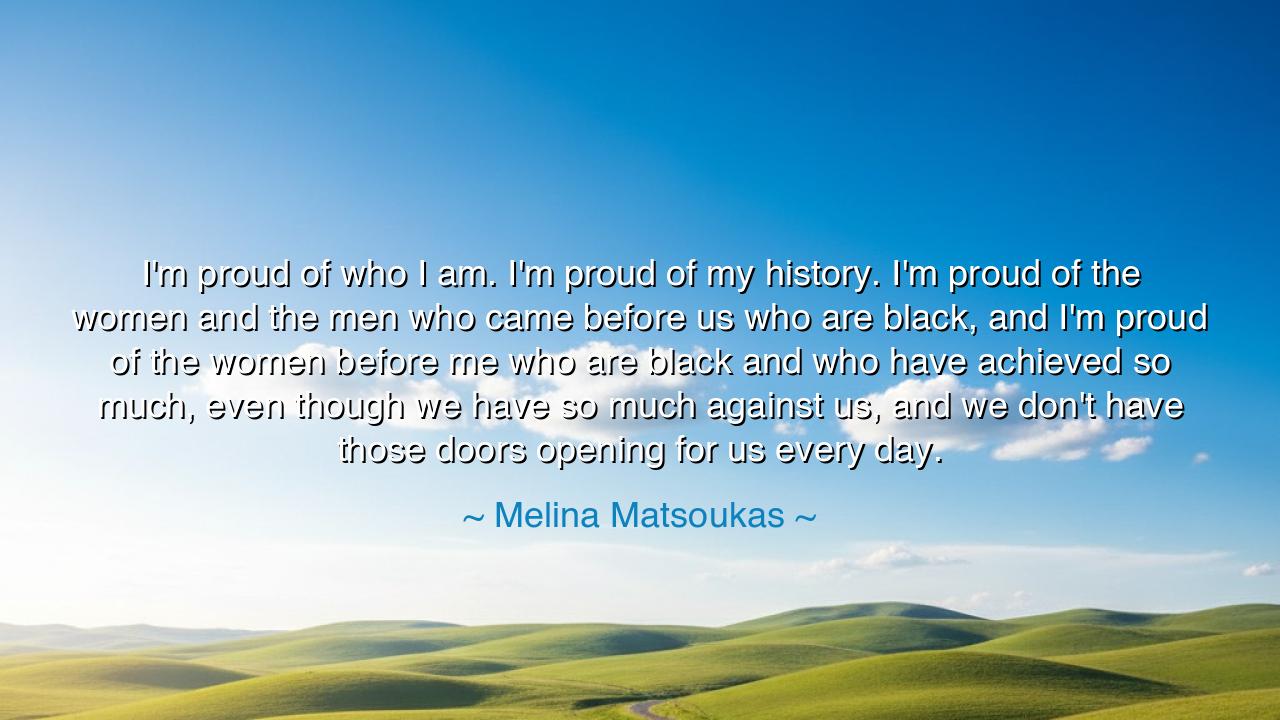
I'm proud of who I am. I'm proud of my history. I'm proud of the
I'm proud of who I am. I'm proud of my history. I'm proud of the women and the men who came before us who are black, and I'm proud of the women before me who are black and who have achieved so much, even though we have so much against us, and we don't have those doors opening for us every day.






“I’m proud of who I am. I’m proud of my history. I’m proud of the women and the men who came before us who are black, and I’m proud of the women before me who are black and who have achieved so much, even though we have so much against us, and we don’t have those doors opening for us every day.” Thus spoke Melina Matsoukas, a visionary of the modern age, a director whose art burns with truth and reverence for the struggle that shaped her. In her words echoes the timeless song of a people—one of pride, perseverance, and inheritance—a declaration not merely of identity, but of remembrance and defiance.
In the tone of the ancients, one might say that Matsoukas speaks as a keeper of the lineage, as one who carries the fire of her ancestors through the storms of her time. Her pride is not the vanity of the self, but the sacred gratitude of the descendant—the recognition that every step she takes was first carved by those who walked barefoot through chains, hunger, and denial. To say “I am proud” in this context is not boast, but honor; it is the whisper of survival transformed into the voice of victory. For pride, when rooted in struggle, becomes an act of resistance.
The black women and men who came before were builders in the shadows of oppression, crafting civilization even when the world refused to see them. Matsoukas calls forth their memory like a priestess invoking the ancestors. Her words recall the courage of Harriet Tubman, who guided her people through the darkness toward freedom; of Rosa Parks, who sat not merely in protest but as a monument of quiet power; of Maya Angelou, whose poetry rose like a phoenix from pain; of Shirley Chisholm, who entered halls of power where no one welcomed her. Each of them opened a door, though the world tried to shut it again and again.
Yet Matsoukas does not speak as one who claims the journey is over. She knows, as every wise soul does, that the struggle continues. “We don’t have those doors opening for us every day,” she says—not in complaint, but in clarity. It is the acknowledgment that even now, opportunity remains uneven, that the weight of history still leans upon the shoulders of the present. And yet, she refuses despair. Her pride is not diminished by injustice; it grows stronger in the face of it. For the flame that is tested by wind burns brighter and steadier.
The ancients believed that to know one’s ancestors was to know one’s destiny. Without roots, the tree cannot stand; without history, the spirit loses its compass. So too does Matsoukas remind her generation and the ones to come that heritage is strength. To forget one’s lineage is to lose the map of resilience. She stands as both artist and oracle, her works—like the music videos she directs, or the films that speak of love, loss, and liberation—serving as bridges between past and future. Through her art, she ensures that the stories of those who came before do not fade, but rise anew in each retelling.
Consider, too, the power of her craft. When Matsoukas directed Beyoncé’s Formation, she crafted not just a music video, but a visual hymn of black identity, filled with symbols of survival, beauty, and rebellion. Every image—black bodies submerged in floodwater, a child dancing before police, women dressed in the regalia of ancestors—spoke of history’s weight and dignity. Through art, she transformed pride into motion, identity into message. This, too, is what she means when she says she is proud: she is the living continuation of a story that refuses to die.
So let this teaching be passed to the generations: be proud of who you are, but know why you are. Pride without remembrance is empty, but pride rooted in history is unbreakable. Remember those who built the roads beneath your feet. When the doors of opportunity remain closed, do not beg—build new ones. When the world forgets your worth, remind it through creation, courage, and unity.
For as Melina Matsoukas reminds us, pride is not a crown you wear—it is a torch you carry. And that torch was lit by those who came before, whose hands were scarred but whose spirits were never broken. Carry it high, children of tomorrow, so that the world may see the light of your lineage and know that the story continues—through you, with pride, and without end.






AAdministratorAdministrator
Welcome, honored guests. Please leave a comment, we will respond soon